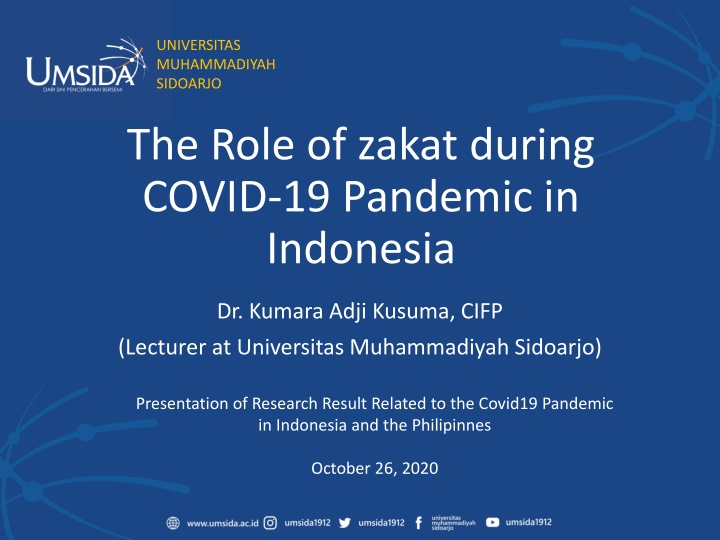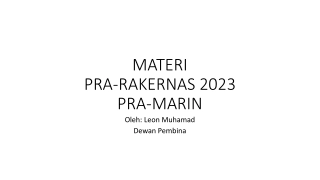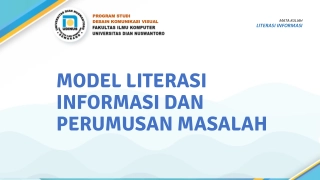
Role of Zakat in Addressing Poverty Amidst COVID-19
Explore the impact of the COVID-19 pandemic in Indonesia, emphasizing the role of Zakat in alleviating poverty and supporting vulnerable communities during these challenging times. Learn about Islamic financial instruments like Sadaqah and how they can contribute to social welfare and economic growth.
Uploaded on | 0 Views
Download Presentation

Please find below an Image/Link to download the presentation.
The content on the website is provided AS IS for your information and personal use only. It may not be sold, licensed, or shared on other websites without obtaining consent from the author. If you encounter any issues during the download, it is possible that the publisher has removed the file from their server.
You are allowed to download the files provided on this website for personal or commercial use, subject to the condition that they are used lawfully. All files are the property of their respective owners.
The content on the website is provided AS IS for your information and personal use only. It may not be sold, licensed, or shared on other websites without obtaining consent from the author.
E N D
Presentation Transcript
UNIVERSITAS MUHAMMADIYAH SIDOARJO The Role of zakat during COVID-19 Pandemic in Indonesia Dr. Kumara Adji Kusuma, CIFP (Lecturer at Universitas Muhammadiyah Sidoarjo) Presentation of Research Result Related to the Covid19 Pandemic in Indonesia and the Philipinnes October 26, 2020
Introduction The Corona virus disease 2019 (Covid-19) pandemic has spread. The capital and several other areas are on alert. The government has advocated reducing activities in public spaces and staying at home as much as possible. A number of offices and schools limit their activities. Lockdown is option that continues to roll. Until antivirals are found, the most likely treatment is to prevent the spread of viral infections. In Indonesia, the virus attacks humans so quickly. As of October 2020, the government stated that averagely 4000 people were positively infected daily. This data places Indonesia as the country with the highest mortality ratio due to this pandemic. In addition to attacking humans, Covid-19 shakes economic stability. Again, the middle-lower class are the most suffering victims. It is in this group that protection against the effects of a pandemic disaster should be a priority. For the poor and vulnerable-poor families, disaster and disease are the determinants that are increasingly plunging them into poverty. Family members who are sick, automatically add to family shopping expenses. 2
Introduction Although the government guarantees financing for suspect Covid-19, operational costs during treatment are a new burden component in the family. The condition gets worse if the suspect is the breadwinner. Instantly, the family lost its source of livelihood and fell into poverty. The pandemic also has a wider impact. Not only for the suspect and his family, but also for workers in the informal sector. The work from home policy in a number of offices and schools is thought to have an impact on informal workers. Street vendors as well as transportation and motorcycle taxi drivers are most exposed to this condition. The value of their business transactions is likely to fall and it could be zero. Reduction and loss of daily income would increase the degree of poverty for them. In this condition, the state should be present, provide protection and a sense of security. It was true that an accelerated handling task force was formed, but that was not enough. There are externalities from the pandemic, impoverishing those who are already poor and vulnerable to poverty. Realizing this, the President has pushed for the transfer of the state budget to help people in the informal business sector. This goodwill is good, but it could be rhetorical only. The use of state finances is inflexible. An APBN-P determination is required for budget relocation. In the midst of a pandemic wave, zakat can actually do more to deal with this situation. 3
Islamic Financial Instruments Islam has financial instruments to alleviate poverty and distribute income fairly. The instrument is sadaqah. the instrument therefore help government programs to reduce inequality and improve social welfare, thereby promoting economic growth. Sadaqah is one s giving as charity in general be it tangible (wealth) or intangible (energy, and even only a smile) forms. For the tangible, there are two types of saqadah the compulsory/mandatory and the sunnah (advised/recommended by the prophet/religion). The Mandatory sadaqah is called zakat (obligatory for the rich) while the Sunnah is called infaq (recommended for everyone to do, including the poor, based on their level of piety) 4
Zakat of Wealth Zakat comprises small parts (2,5%) of one s idle asset which equal to 85 grams of gold and is kept for one lunar year. Zakat is given to eight categories the poor and the indigent, and to those who work on [administering] it, and to those whose hearts are to be reconciled, and to [free] those in bondage, and to the debt-ridden, and for the cause of God, and to the wayfarer. [This is] an obligation from God. And God is all-knowing, all-wise. - Al-Tawbah, 9:60 In Indonesia zakat is regulated in the 2011 law on zakat management. The conditions of one type of tithes, the zakat mal, for instance, is that the asset, including salaries, has to have accumulated for one year. 5
Other form of Zakat In addition to zakat mal, before celebrating Idul Fitri, every Muslim is required to pay zakat fitrah, which is around Rp 40,000 (US$2.72) per person, today s value for 2.5 kilograms of rice. Its main purpose is to help the poor and needy join the celebration while purifying those who fast from inappropriate actions or comments. 6
Zakat and Covid-19 in Indonesia To help the nation overcome this pandemic, one thing Muslims can do is optimizing the aforementioned instruments to help communities survive. To help affected people and support the needs of health equipment The Indonesian Ulema Council (MUI) even stated in its April fatwa (Islamic jurists opinion) on sadaqah (Zakat and infaq) funds especially that contributions from zakat mal do not have to wait for one year s accumulation of assets. 7
Potential of Indonesias Zakat According to the National Alms Agency s (Baznas) Potential Mapping Indicator, the potential for zakat in 2019 was Rp 233.8 trillion (US$ 15.7 billion). Baznas also stated that the nationwide potential this year was about Rp 340 trillion. Even though the realization this year would be far from initial expectations, the amount of zakat income in 2020 would still be very significant to aid millions of people severely affected by COVID-19. 8
Issue on Zakat Institution As always, the issue is accountability and whether anyone can raise such public funds. According to the Zakat Law, Baznas and zakat management institutions (LAZ) are authorized to collect and distribute zakat. While Baznas was formed by the government to manage zakat at the national level, LAZ are formed based on community or organization initiatives. At present, Baznas exists in all 34 provinces and 514 regencies/cities. Meanwhile, there are 24 LAZ at the national level, 12 at the provincial level and 33 across regencies/cities 9
Zakat Institutions Accountability All LAZ must be legal as they manage public funds. Competence is required adequate knowledge, skills and the right attitudes, willingness and ability to understand and comply with Islamic legal interpretations on zakat; thus good intentions are not enough for the manager or amil zakat. What is more important is accountability, which is both spiritual and operational. Accountability thus means the zakat managers accountability to God, and because humans are God s representatives on earth, they must be accountable to their fellow humans. 10
Arcticle on Zakat Article 38 of the Zakat Law also stipulates that people are prohibited from acting as the amil zakat to collect, distribute or use zakat without permission from authorities. The law states a violation of this rule can result in a maximum penalty of one year in prison and a fine of Rp 50 million. 11
Requirements of Zakat Institutions Therefore, the management of zakat must meet the following requirements. First, it must be registered under an Islamic community organization managing education, Islamic preaching and/or social affairs, and as a legal, nonprofit entity. Second, it must acquire recommendation from Baznas. Third, it must have a sharia supervisor. Fourth, it must have the technical, administrative and financial capabilities to carry out its activities. Fifth, it must have a program to utilize zakat for peoples welfare. Sixth, it must be prepared to be audited regularly according to principles of sharia and finance as regulated under the Zakat Law. 12
Future Challenge Now, how can we align zakat management law with the informal collection and distribution of alms and tithes in the community? This is what needs attention. Don't let burgeoning charity, especially in these difficult times, be hampered by regulations and red tape. 13
Conclusion The pandemic has aroused extraordinary solidarity among citizens, with all elements of society working to help others. Don t dampen this spirit because some of the efforts may be considered illegal. This is where Baznas and LAZ needs to be more proactive, simplify the bureaucracy and take the initiative to work directly with communities through neighborhoods and mosques throughout Indonesia by forming zakat management units among communities while involving the locals. The local units would be able to obtain data on the amount of tithes and alms in the regions. Data collected from the community can be accumulated as part of national ZIS management data. Any initiative to collect zakat funds must be monitored by the authorities to avoid fraud and to ensure the collection and distribution follows the law. In this way, zakat would become a real power that can be used to help the government overcome the COVID-19 disaster. 14
Thank You 15


